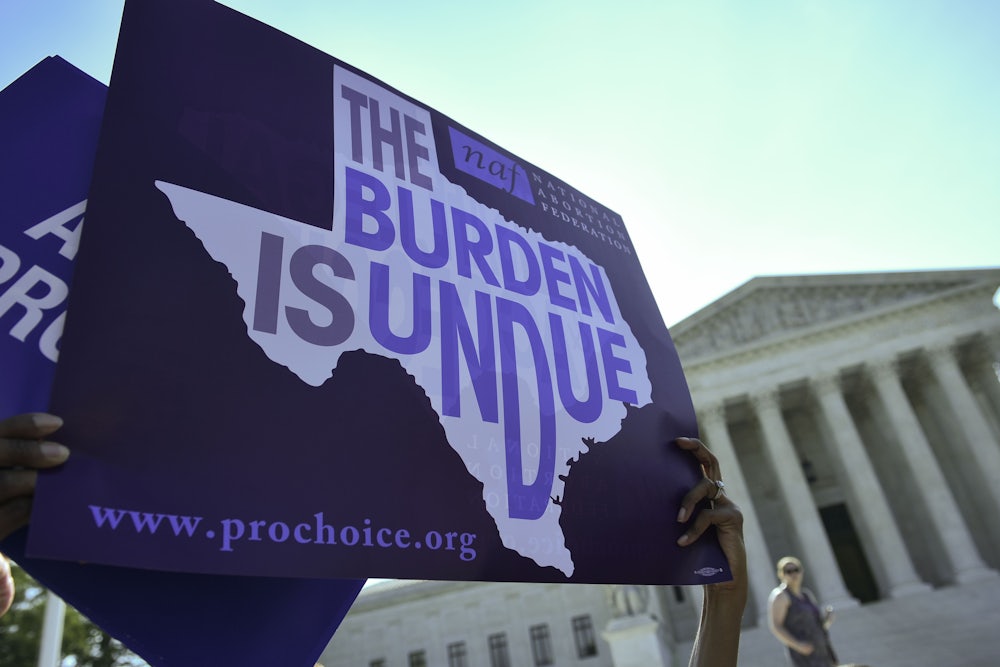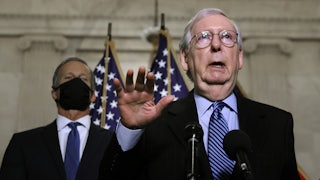From the Lochner era onward, the Supreme Court’s fealty to protecting corporate wealth has been so comprehensive that it would be hard to believe that the conservative justices who recently opted not to stop Texas’s new abortion bounty law, S.B. 8, didn’t consider whether their decision would be bad for business. It was the Roberts court, after all, that sparked what New Republic contributor David H. Gans referred to as a “First Amendment revolution” for corporations, which took home a sizable bounty from the court’s most recent term. For the conservative bloc to abandon them now would mark a significant moment of apostasy—though it’s perhaps one trade-off that Trump’s troika of justices were willing to make.
In recent days, some have expressed hope that corporate America, recognizing the economic risks as GOP-controlled legislatures across the country target reproductive rights, might find some way to intervene. But the evidence of such an e-suite revolt is thin. As CNN reported, the two most prominent ride-hail apps, Uber and Lyft, pledged to cover the legal fees of any driver sued under S.B. 8 for “aiding or abetting” an abortion; Lyft also made a donation to Planned Parenthood. Two Texas-based dating apps announced that they would be creating a “relief fund” for those adversely affected by the law.
These modest moves were enough to agitate New York Post op-ed editor Sohrab Ahmari, who warned of the overwhelming force that corporate “wokesters” were likely to bring to bear on these grand conservative designs. There’s little to substantiate any sincere fears: As The New York Times reported, while “American Airlines and Dell Technologies, two of the state’s biggest employers, were early and vocal critics” of Texas Republicans’ voter suppression bill, neither firm offered comment about the abortion law. Nor would two dozen other “major companies,” among them some of the “biggest employers in Texas, including AT&T, Oracle, McKesson and Phillips 66.”
In Virginia—where, TNR’s Grace Segers reports, Democrats are hoping the Texas law will help turn out their voters—American Airlines and Dell are on the mind of Terry McAuliffe, as well. As The Washington Post’s Dave Weigel reported, the former and potentially future governor mused, on a conference call, about poaching Texas-based firms and bringing them to the Old Dominion: “We should call Dell, we should call American Airlines.”
Economic development is certainly within the governor’s remit, but it’s naïve to expect firms to base themselves in any given state for reasons other than perks that fatten their bottom lines, such as big tax giveaways and other incentives that might entice corporate boards to make a switch. It’s also far from clear how relocating Texas-based companies to Virginia would necessarily help the women of Texas, other than depriving them of potential employment options while leaving the law in place.
Besides, S.B. 8 is also a product of corporate influence. As Popular Information’s Judd Legum reports, a rogue’s gallery of major companies—AT&T, Comcast/NBC Universal, CVS Health, United Health Group, Anthem, General Motors—donated hundreds of thousands of dollars to the GOP lawmakers who backed the law. While some of these firms have made noises in the past about potential repercussions for passing an anti-abortion law, none have been tested in the way that Texas now threatens. And if the past is prologue, any commitments these firms make today may not have a long shelf life.
As The Houston Chronicle’s Chris Tomlinson told NPR, S.B. 8 does pose some risk to Texas’s tax base, perhaps causing a “slowdown of [new] companies coming to Texas.” It’s possible some tourists may take their dollars elsewhere. Texas Governor Greg Abbott seems unperturbed, however, telling CNBC that his party’s doings are only “accelerating the process of businesses coming to Texas.” Abbott’s hot talk may be mere bravado; he’s hardly the first Republican to become “unmoored from reality.” But it’s not certain that capitalism is in conflict with the idea that the state should control women’s bodies. And if the erosion of reproductive rights doesn’t threaten shareholder earnings in any significant way, expect corporate America to turn a blind eye yet again.
This article first appeared in Power Mad, a weekly TNR newsletter authored by deputy editor Jason Linkins. Sign up here.








